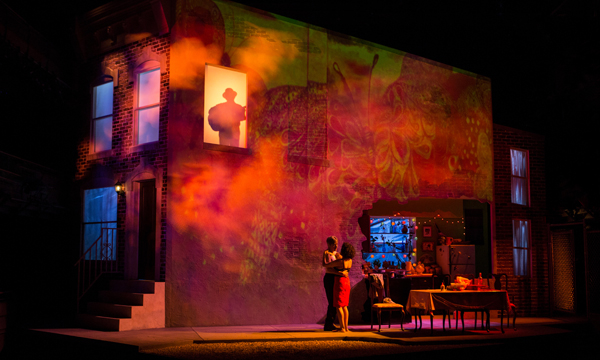How often do audiences in a given city get the chance to see a full body of work by a single living playwright in the span of just one month? When this does happen, how often is the playwright a woman? Or Latinx? While this may be a common occurrence in New York and London, it is a rarity in places like Houston, Texas. But this is changing in 2020. Playwright Quiara Alegría Hudes’ much-acclaimed Elliot Trilogy—Elliot, A Soldier’s Fugue, Water by the Spoonful, and The Happiest Song Plays Last—comes to Houston in February-March 2020 in a unique collaboration between Main Street Theatre, Stages Repertory Theatre, and Mildred’s Umbrella Theatre Company.
Speaking to its robust theatre community, Houston joins one of a handful of cities to feature Hudes’ trilogy through a collaborative model that sees each play being produced by a different company, but with the marketing resources and community support of all three companies pushing the work forward (other cities include Los Angeles and Santa Fe). When Stages announced their production of Water by the Spoonful, Main Street Executive Artistic Director Rebecca Greene Udden contacted Stages’ Artistic Director Kenn McLaughlin about the two companies joining forces to produce the first two plays in the trilogy simultaneously along with Mildred’s, who would produce a staged reading of the third play. McLaughlin and Mildred’s Umbrella’s Artistic Director Jennifer Decker enthusiastically jumped on board with Udden’s proposal. Main Street and Mildred’s Umbrella’s installments in the trilogy will join the umbrella of Stages Repertory Theatre’s third annual Sin Muros: A Latinx Theatre Festival (February 8-March 7; the full festival weekend is February 13-16), under which Water by the Spoonful was already headlining.
The Elliot Trilogy has been recognized by some of theatre’s highest honors (for instance, Water by the Spoonful won the Pulitzer Prize for Drama in 2012). Hudes’ plays have been produced globally, helping earn the playwright an annual spot on American Theatre’s list of the most produced playwrights in the country. And, despite the rich success of the Elliot Trilogy, it isn’t even Hudes’ most well-known work—she wrote the book for the Tony Award-winning smash-hit musical In the Heights. By any measure, Hudes is at the very top of American playwriting today and this fact couldn’t be more apparent than in the Elliot Trilogy.
Drawing inspiration from Hudes’ real-life cousin Elliot, the Elliot Trilogy tells the story of a Puerto Rican family in North Philly. While Elliot Ortiz is indeed the through-line of the three plays, each installment is a stand-alone piece focusing on a particular aspect of the family. According to Hudes, the three plays all deal “with the things we don’t talk about”—drug addiction, PTSD, war injuries, and how these things affect family. If René Marqués’s La Carreta (The Oxcart) is the 20th-century’s defacto play about a family moving from Puerto Rico to New York in pursuit of the so-called “American Dream,” Quiara Alegría Hudes’ Elliot Trilogy is the 21st-century’s response to what that family looks like 50 years later. While the journey of Elliot’s family is indeed a Latinx story, it’s also an American trilogy.
The Elliot Trilogy launches with Elliot, a Soldier’s Fugue at Main Street Theatre. Under the direction of Rebecca Greene Udden, the production runs February 8 to March 1. In Elliot, Hudes’ introduces audiences to Elliot, his father, and his grandfather as they look back on their experiences as soldiers in the Korean, Vietnam, and Iraq Wars. The play features almost no direct dialogue; rather, the play is comprised of soliloquies, monologues, and reading and writing letters.
“I have loved this material ever since I first read the whole trilogy many years ago,” says Udden, adding, “It had been on my mind to produce the trilogy, but we couldn’t do it alone. I hope theatregoers will take note of this collaboration and take advantage of the opportunity to get to know all three companies.”

Gerardo Velasquez as Elliot and Luis Galindo as Grandpop in Elliot at Main Street Theatre. Photo by Bryan Kaplún.
Stages Repertory Theatre’s production of Water by the Spoonful runs February 7 to 23. Under the direction of Jerry Ruiz, the production will be the first show produced on the Lester and Sue Smith Stage, one of three theatres in Stages’ new $34 million home, the Gordy. In Water by the Spoonful, Elliot, back from Iraq, disabled, and addicted to painkillers, is filled with hurt and anger about both his life in Philadelphia as well as what he experienced in the war. He struggles to find healing alongside his cousin Yaz and his birth mother, Odessa, who moderates a chat room for recovering crack addicts such as herself. In a unique twist, many scenes in the play occur in an internet chat room.
According to Ruiz, Water by the Spoonful is one of the most complete plays from the past decade. Hudes’ characters are flawed, yet completely worthy of our empathy despite not always being easy to like. “What really hits me about the play working on it now is that it’s about the importance of human connection, of community, of family–whether biological or chosen,” notes Ruiz. “Those necessary connections keep us going through the most difficult challenges that life can throw at us. I hope this production brings that idea to the forefront.”
Houston’s Elliot Trilogy culminates with Mildred’s Umbrella’s staged reading of The Happiest Song Plays Last, running March 5-7 under the direction of Jennifer Decker. In The Happiest Song Plays Last, Hudes’ once again turns to contemporary technology to examine the way we communicate. Elliot and Yaz often communicate through Google Chat and, thus, avoid answering each other’s probing questions. Elliot finds himself in Jordan, where he has suddenly become the start in a film about the Iraq War.
For Mildred’s, the play is a natural fit. “We support female playwrights, and the plays are fabulous, but also we are honored to collaborate with two of Houston’s most respected theatres,” says Decker, adding, “Collaboration is something we’ve always been excited about, because it strengthens the community as a whole, and we’re very excited to be a part of this.”
It’s fitting that Hudes’ plays will be used to connect these three theatre companies and help build a stronger theatre community in Houston considering that, for Hudes, the trilogy has been just that—a vehicle for community. According to Hudes,
“One of the beautiful journeys of my artistic life has been connecting with Latinx communities across the nation. I grew up in Philly, knowing our Puerto Rican family and friends en el barrio. But it wasn’t until my late 20s, when I traveled to South Coast Repertory for the Hispanic Playwrights Project, that I began to meet and gain friendships in other kinds of Latinx communities—like Latinx artist circles. It was a total revelation. I began learning more about my Caribeño and Latin American hermanas, we told each other about our families and cultures. Through the Elliot Trilogy, I have come to know the Latinx and Boricua communities in New York City; Hartford, Connecticut; Chicago; Los Angeles; Miami; Portland, Oregon; and beyond. We are everywhere! Because creating the trilogy spanned ten years of my creative life, I sometimes got to return to those communities for the second or third installment and deepen relationships with actors who’d done the roles already.”
The Elliot Trilogy joins a season of Latinx theatre in Houston of sorts, joining the Alley Theatre’s Quixote Nuevo by Octavio Solis (January 17 to February 9) and The Catastrophic Theatre’s Fefu and Her Friends by Maria Irene Fornes (February 14 to March 8). While Latinx theatre offerings such as this would seem completely normal in a city of comparable size and stature— such as Chicago, for example—in Houston this is not the norm. Latinx stories remain under-told on Houston stages. Even so, the work of companies such as Gente de Teatro and TEATRX in addition to initiatives by Stages Repertory Theatre and the Alley Theatre demonstrate that Houston may be on the cusp of a change. While it is too early to say what that change will look like, one thing is certain—cross-company collaboration can be a game-changer in increasing access and inclusion within the Houston theatre community.

The Happiest Song Plays Last at Goodman Theatre. Photo by Liz Lauren.
This collaboration is particularly noteworthy, especially in Houston, a city rich in resources but without a history of cross-company collaboration. “We’re always helping each other. There’s always collaboration, but never on this scale,” notes Udden. “It was a lucky chance that this was able to happen and that we were able to coordinate the trilogy.”
Udden, who has been a mainstay in the Houston theatre community since her time as an undergraduate at Rice University before eventually founding Main Street in 1975, believes that collaborations such as this can become more common in a city like Houston. According to Udden:
“There’s a real collegiality within the theatre community. We aren’t necessarily organized as a group, but we all in each other’s pockets all the time. We use the same artists. We use the same resources. We’re always sharing what we have. I think it’s pretty likely that this is something that can happen in Houston more than in other places.”
As the Elliot Trilogy sets to open in Houston, Quiara Alegría Hudes remains grateful for how her work has been embraced across the country: “I send Houston’s Latinx community, and Houston allies of all colors, creeds, and traditions, my heartfelt enthusiasm and gratitude. My spirit is expanded to be a part of your world.”
This post was written by the author in their personal capacity.The opinions expressed in this article are the author’s own and do not reflect the view of The Theatre Times, their staff or collaborators.
This post was written by Trevor Boffone.
The views expressed here belong to the author and do not necessarily reflect our views and opinions.


















